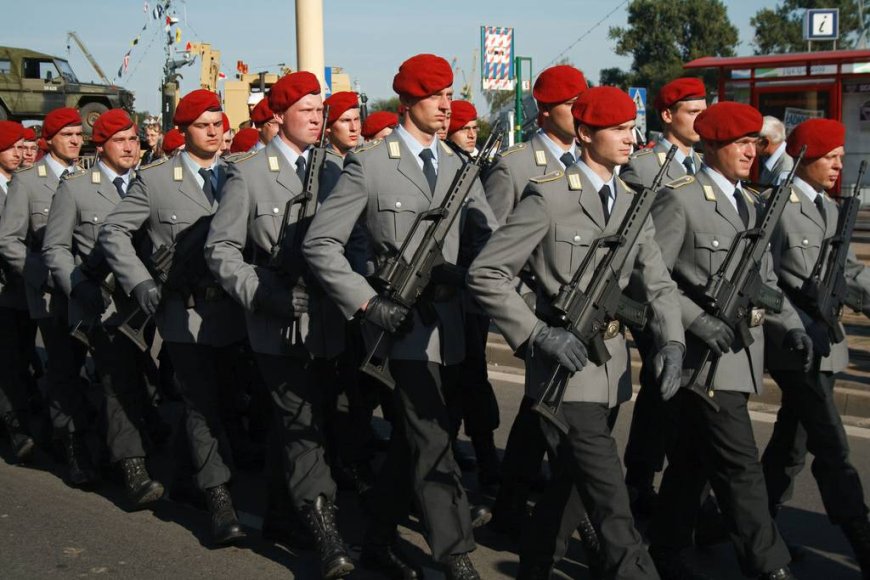Germany's Historic Turning Point in Defense Strategy: A Game-Changer in Europe?
The recent approval of Germany's first comprehensive national security strategy by the Chancellor Olaf Scholz administration marks a pivotal moment for the nation. Spearheaded by Boris Pistorius, the federal minister of defense, this groundbreaking strategy showcases a concerted effort to address security concerns through a new lens. Germany's heightened focus on security policy attests to its growing political commitment to safeguarding its national interests. The backdrop of the Ukraine conflict has further accentuated the urgency for Germany to prioritize a durable military strategy.

The reception of this document within the European political arena has been overwhelmingly positive, with its core principles finding approval within Germany itself. The strategic framework rests on three pillars: robust defense capabilities, unwavering resilience, and enduring stability—all of which the German government ardently endeavors to achieve. In line with this strategy, Chancellor Scholz recently notified the German Ministry of Defense of a complementary document, signaling a continued commitment to military reform.
In a same strategic line, Pistorius emphasized Berlin’s intention to expedite the transformation of its military bureaucracy as an integral part of ongoing military reforms. The restructuring aims to bolster Germany's capacity to defend both its own interests and those of its allies. The new defense directives unequivocally assert that Germany must be the bedrock of deterrence and collective defense in Europe. The document aptly states, "Our citizens, as well as our European, North American, and global partners, expect us to shoulder this responsibility." To fulfil this duty, the Bundeswehr, Germany's armed forces, must stand prepared for multifaceted challenges, with personnel and equipment primed to execute demanding missions.
The document further advocates that a well-equipped military capable of prevailing in high-intensity conflicts is the sole guarantor of deterrence and credible peace. It endeavors to dispel any ambiguities lingering within the main defense program while underscoring Germany's European identity, thereby fostering the support and trust of its allies. Although it may seem daunting, resolving the challenges aligned with Europe's shared understanding of risks is within the realm of possibility.
Notably, Germany established a dedicated fund of 100 billion euros ($106 billion) last year for the acquisition of modern weaponry. Additionally, the nation has committed to meeting NATO's target of dedicating at least 2 percent of its gross domestic product to defense by 2024. The new defense policy document calls for expeditious decision-making regarding crucial equipment and infrastructure procurements. Criticized in the past for sluggish procurement processes, the government and military must harness existing exceptions to accelerate contract awards and, if necessary, work towards legislative amendments.
Minister Pistorius concedes that reforming the armed forces will require time, acknowledging the organization's decades of neglect. Another pivotal aspect of this document is the explicit recognition of Russia as a significant threat to Germany and its European allies. This categorization carries profound implications for Germany, potentially affecting the long-term trajectory of the ongoing conflict. Overlooking Russia's interests in resolving the war would exemplify an unrealistic approach to this crisis. Perhaps if Germany were to pursue mutual trust-building measures with Russia instead of direct confrontation, substantial military expenditures could be redirected to other areas. Such a course of action would alleviate economic pressures on households, affording the German coalition government greater flexibility in advancing its economic agenda.
The last set of defense policy guidelines presented by the German government dates back to 2011. The resolute determination to swiftly implement this plan, regarded as a historic turning point in Germany's policy, is evident. In this pursuit, Germany actively seeks expertise from NATO member states to refine its strategies and programs. NATO, cognizant of Germany's pivotal role in advancing collective defense, embraces this opportunity to foster further cooperation. Moreover, Germany aims to underscore the significance of transatlantic relations through its extensive collaboration with NATO. Such an approach enables Germany to assume a leadership role within the European Union and forge closer ties with fellow member states.
However, while Germany's robust military posture fortifies European defense, it simultaneously raises concerns. An aggressive stance in military matters could potentially escalate armed conflicts and create challenges within the gray area that exists beneath the threshold of war. Europe, burdened by historical apprehensions surrounding Germany's military might, must engage in thoughtful deliberations regarding the extent of trust and reliance they can place in their German counterparts.
Germany's strategic shift represents a watershed moment in European security and defense. As the nation charts its course towards a more comprehensive and interdisciplinary approach, the world watches with anticipation. The successful execution of this strategy will not only safeguard Germany's interests but also shape the future of European defense cooperation.













































